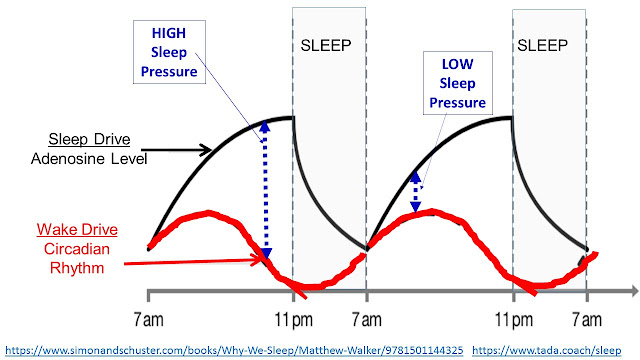When people ask me: “what’s more important, diet or exercise?”
I typically answer: “sleep.” Dr. Nalini Chilkov
(This part was used for a talk at the Burnbank Centre, Hamilton, Scotland in April 2019)
Sleeping seven to eight hours a day is essential for adults. In Part 1, I have discussed the evidence from recent scientific research about the relevance of sleep for humans and animals with the clear message that sufficient sleep (7 to 8 hours) is not only important for our physical and mental health/welfare, but a lack of good quality sleep has many serious unwelcome consequences (See slide below for a summary).
(click on the slide to see full page image; press Esc to return to text)
People who sleep too little or too long have increased chances of dying and occurrence of major cardio-vascular events. It is recommended that adults sleep 8 hours per day but children should sleep somewhat longer depending on their age.
Along with good diet, clean water, clean air and adequate exercise, sleep is one of the five pillars of good health.
Electrical Activity of the Brain and Sleep Cycles: Our brain controls most body functions through electro-chemical signals. The neurons in the brain are actively talking to each other. In fact, human brain weighs 1.3 kg (about 2% of the body mass) but is responsible for consuming about a quarter of the base metabolic energy (the brain's energy consumption is ~600 Calories per day).
Interestingly, the brain uses as much energy when we sleep as it does when we are awake - even more during some periods of sleep.
When awake, we are interacting with the world around us - thinking and making decisions, and a large amount of input is provided to the brain from objects and events around us.
When sleeping, the brain is certainly not interacting with the outside world and the question is - what is the brain using the vast amount of energy for?
Let us first look at the way the electrical activity of the brain is measured and point out the differences & relevance of different types of sleep.
An EEG, electroencephalograph, collects electrical activity from the brain and plots the signal as function of time. The wavy pattern tells us what is happening in the brain. One can study signal from individual parts of the brain to learn how active different parts of the brain are at any particular time.
Despite a large amount of descriptive information about the various stages of sleep, the functional purposes of the sleep states are not known. Whereas, most sleep researchers accept the idea that the purpose of non-REM sleep is at least in part restorative, the function of REM sleep remains a matter of considerable controversy.
In the following slides, I shall present typical electrical activity of the whole brain during when you are awake and in different phases of sleep.
Most slow wave sleep (NREM3) occurs in the first two cycles while REM sleep dominates the last two cycles before waking.
Sleep is also essential for disposing metabolic waste from the brain - this is explained in the next slide
Molecules that Make Us Sleep: There are two ways human body feels sleepy.
1. Circadian rhythm causes secretion of hormone melatonin at certain time of the day (at the onset of darkness). Melatonin tells the body that it is time to rest and sleep. More of this later...
2. The chemical adenosine acts as a sleep-inducing (hypnogenic) molecule. Adenosine is produced by the break up of adenosine triphosphate (ATP) during energy generation to power bodily functions. The activity of the neurons and gilial cells causes a build up of adenosine in the brain and this increases the sleep pressure. After 12 to 16 hours of wakefulness, the level of adenosine and hence the sleep pressure reaches a high value and one has a strong desire to sleep. During sleep, adenosine is destroyed and after 8 hours of sleep, adenosine levels reach a low value with a correspondingly weaker sleep pressure. This is shown in the slide:
Adenosine works by attaching itself to receptor sites in the brain to induce sleep pressure. Substances like caffeine have similar molecular structure to adenosine and are present in tea, coffee, coke and many other food items. Caffeine attaches to adenosine receptors in the brain and prevents the build up of sleep pressure. That is why, it is advisable to avoid caffeine 4 to 5 hours before sleeping time in order to ensure a good night sleep.
Circadian Rhythm (Internal Biological Clock):
Different body functions rise and fall at set times of the day based on your circadian rhythm. Your circadian rhythm controls when you should sleep and when you should be awake (alert and active).
Additional Recent Information: Night owls: Simple sleep tweaks boost wellbeing (10 June 2019)
Final Word: Good quality sleep of 7 to 8 hours is absolutely essential for adults - children need more. The benefits are huge ..
The science of sleep is fascinating and, like anything else in the human body, complicated. I am really curious to learn about the dreams - why do we dream and what is the purpose - as I had said in part 1, evolution does not do anything without a reason - there must be an important function that dreams serve - we just need to find it. Wait for part 3...
Please pass on the link to friends and family; sleep is an important enough topic to worth shouting about.
Please click here for PART 1 https://ektalks.blogspot.com/2019/01/sleep-part-1-why-do-we-need-to-sleep.html
Recent references: https://www.medscape.com/viewarticle/914244_1
























